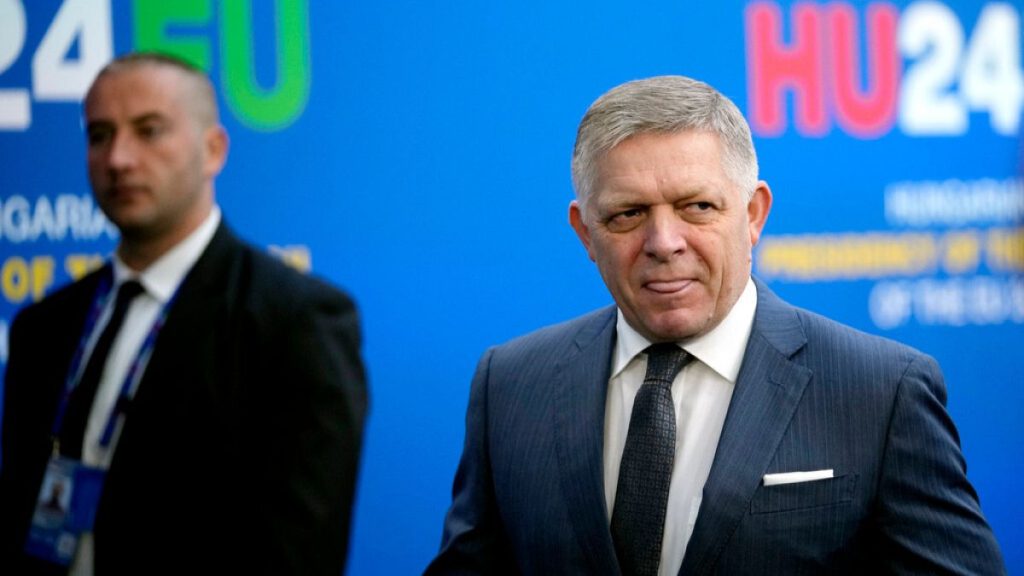The cessation of Russian gas transit through Ukraine has ignited a diplomatic row between Slovakia and Ukraine, with Slovak Prime Minister Robert Fico threatening retaliatory measures against Kyiv. Fico’s proposed actions include halting financial aid to the over 130,000 Ukrainian refugees residing in Slovakia, potentially cutting electricity supplies to Ukraine, and demanding compensation for the financial losses Slovakia claims to have incurred due to the disrupted gas flow. This transit, utilizing a Soviet-era pipeline, was halted on New Year’s Day after Ukraine refused to renew a five-year agreement with Gazprom, the Russian energy giant. Kyiv’s decision stems from its unwillingness to allow countries to profit from the ongoing conflict, a stance that has exacerbated tensions with Slovakia.
Fico’s argument centers on the economic repercussions of Ukraine’s decision. He contends that halting Russian gas transit will inflate European gas and electricity prices, ultimately harming the European Union more than Russia. While Slovakia itself claims to have secured alternative gas sources, including a short-term contract with Azerbaijan and a deal for US liquefied natural gas via Poland, Fico estimates a loss of €500 million in transit fees for Slovakia. He further projects a staggering €120 billion loss for the entire EU over the next two years. This contrasts with the European Commission’s assessment, which suggests that the EU is adequately prepared to manage without Russian gas through alternative sources like LNG and non-Russian pipeline imports.
The differing perspectives on the impact of the halted gas transit underscore the complexities of the situation. While Fico frames the issue as an economic blow to Europe, Ukraine views it as a moral imperative, refusing to facilitate financial gains for Russia amidst the ongoing conflict. This disagreement reflects a broader geopolitical tension, with Slovakia, historically maintaining amicable relations with Moscow, prioritizing economic stability, while Ukraine prioritizes its sovereignty and resistance to Russian influence. This dynamic is further complicated by Slovakia’s role as a host country for a significant number of Ukrainian refugees, adding a humanitarian dimension to the economic and political considerations.
Fico’s stance has drawn criticism, particularly from Ukrainian President Volodymyr Zelenskyy, who accuses him of aiding Russia’s war effort and weakening Ukraine by attempting to maintain gas transit agreements. Zelenskyy characterizes Slovakia’s efforts as opening a “second energy front” against Ukraine at Russia’s behest. This accusation highlights the delicate balance Slovakia must navigate between its historical ties with Russia, its economic interests, and its humanitarian obligations to Ukrainian refugees. Fico’s meeting with Russian President Vladimir Putin last month to discuss gas supplies further fueled these tensions, particularly as it was during this meeting that he first threatened to halt electricity supplies to Ukraine.
Poland, a key player in the regional energy landscape, has offered to increase energy exports to Ukraine to compensate for potential losses resulting from Slovakia’s retaliatory actions. This intervention underscores the regional implications of the dispute, with neighboring countries taking sides and offering support to either Slovakia or Ukraine. The European Commission’s position, emphasizing the EU’s preparedness to manage without Russian gas, further complicates the picture, suggesting that Slovakia’s projected economic losses may be overstated.
The ongoing dispute over the halted Russian gas transit highlights a complex interplay of economic, political, and humanitarian factors. Fico’s threatened retaliatory measures against Ukraine, including halting refugee aid and electricity supplies, underscore the high stakes involved. His arguments about the economic impact on Slovakia and the EU are countered by Ukraine’s moral stance and the European Commission’s assurances of alternative gas supplies. The situation is further complicated by historical relationships, regional alliances, and the ongoing humanitarian crisis caused by the conflict. The evolving dynamics of this situation warrant close monitoring as it has the potential to significantly reshape the energy landscape of Central Europe and exacerbate existing geopolitical tensions.














